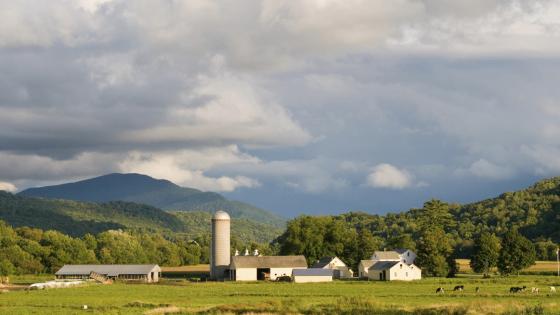Posted March 17, 2022 at 10:36am by Anonymous (not verified)
No One to Take Over the Farm

Written by Erica Housekeeper
The original version of this post was published on the UVM Food Feed blog.
Nearly 30% of New England’s farmers are likely to exit farming over the next decade, and nine out of 10 of those farmers do not have someone else ready to take the reins, according to new analysis of U.S. Census of Agriculture data that was part of a study released this week by American Farmland Trust and Land for Good.
In Vermont, farmers age 65 and older operate 28% of the state’s farms. Of these 2,076 senior farmers, just 9% of them have someone under age 45 managing the farm with them. The study also found that Vermont had 19% fewer young (under age 45) farm operators in 2012 than in 2002, according to a press release issued about the study.
The yearlong Gaining Insights, Gaining Access study looked at characteristics of New England’s farm population at both ends of the spectrum—those at or beyond retirement age, and those young or new to farming. Based on focus groups with farmers, the study documents that older farmers are concerned about retirement, especially those farmers without a next generation farmer or owner to take over. Farmers are also unsure about how to find a younger farmer who can afford to buy their land. Many also want help to make sound transfer agreements.
A Goal to Protect and Protect and Expand Environmentally Sustainable Farmland in Agricultural Production
The study raises key concerns that are similarly outlined in Vermont Farm to Plate Network’s Land in Agriculture Goal, which states that agricultural lands and soils must be available, affordable, and conserved for future generations of farmers and to meet the needs of Vermont’s food system.
According to the Network, total farmland in New England has decreased 9.1% (421,630 acres) from 1982 to 2012. Vermont has lost the most farmland in New England during that timeframe—322,728 acres (a 20.5% decrease). From 1997 to 2012, New England experienced a slight rebound with a 1.7% (69,888 acres) increase in farmland. However, Vermont experienced a 4.8% (63,602 acres) decrease during this period.
Access to affordable farmland is imperative to increasing the local food supply and growing the agricultural economy. The Farm to Plate Network is creating strategic partnerships and tools to address a continuum of farmland access issues, including farm succession planning, farmland conservation, and farmland investment, leasing, and matchmaking. The Farm to Plate Network is also working to improve soil and water quality through research, monitoring, sharing, and training.
The Study’s Findings
The American Farmland Trust and Land for Good embarked on the study to gain a better understanding of New England's older farmers, who own and manage a significant amount of the region's farmland, said Cris Coffin, policy director of Land for Good.
The study used a special sort of 2012 Census of Agriculture data to see how many farmers over age 65 are farming with a young farm operator, and used focus groups of older farmers to learn directly from them about their hopes for the future of their farm and land, their plans for retirement, and the challenges they see in achieving their visions for the future, Coffin said.
American Farmland Trust and Land for Good were also interested in learning more about the next generation of New England farmers and used a special sort of 2012 Census of Agriculture data to examine the demographics and characteristics of beginning farmers, and looked more closely at existing Census data around young farmers.
Findings that Coffin found particularly important include:
- 9 out of 10 farmers age 65+ in New England do not have a farm operator under age 45 working with them. This was remarkably consistent in each of the six New England states.
- In every New England state, a majority of beginning farmers are over age 45. This has important implications for the future of agriculture, and suggests that the needs of beginning farmers may be very different depending on their age.
- Every New England state, except Rhode Island, had fewer young (under age 45) farm operators in 2012 than they had in 2002—and in several cases it was a double digit percent drop. This also has important implications for the region, and suggests that more needs to be done to support and sustain younger farmers.
Additional information about the study and a profile of findings from each state can be found on the American Farmland Trust and Land for Good websites at www.farmland.org/gaininginsights or www.landforgood.org/gaininginsights.
